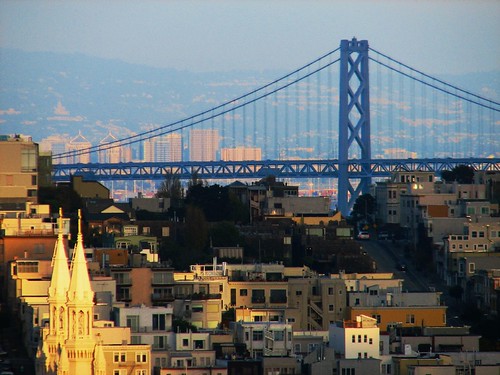Ciudade de Deus

Wow, this was a good film (or DVD actually)! I had kind of heard about it when it came out, and then a little after, but never got around to watching it until this Sunday. It brought to mind right away “Goodfellas”, because of the obvious similarities with criminality and gang or mob mentality. As well, there was narration throughout the film by the narrator/protagonist Buscape (Rocket), a decent kid just trying to make it out of the favela one day, in the same way that the main character in "Goodfellas" (or was it Casino?)narrated throughout the film. This sort of interactive narration by a main personality throughout a film also seems to be a characteristic found within much of French cinema, from the '50's all the way to today with "Amelie", so I'm sure that was also an influence upon this film. The cinematography, scenes, angles, settings, as well as the stop/go action, was really quite innovative and amazingingly presented. The film was set in the '60's in the beginning, but then moved into the '70's as the favela gang kids of the Ciudade de Deus (the "City of God", a Rio favela)in Rio de Janeiro moved into their teen-age years. I loved the nightclub scenes, where different groups of kids hung out together and danced in cliques called Soul (American music, James Brown and other soul artists), Salsa, and a clique called Groovy or the Groovies ( I think these were more rich kids and pop music), as well as some other cliques. I didn't know such a scene existed in Brazil in the '70's; I guess I just assumed that it was primarily samba and bossa nova (clueless American!). The movie just really demonstrated though the harsh and violent life of the favela, especially for the young people, and the very limited options that were available to them. The characters were essentially based upon real individuals, Lil' Ze, a mean, cruel fellow even as a little kid, Knockout Ned (or Mane Galinha), another fellow drawn into a life of violence really through no fault of his own, and of course Rocket (Buscape), a kid who has dreams of being a photographer, and eventually provides dramatic photos of favela violence to the Rio de Janeiro papers, by first starting out as a simple paperboy, and then landing himself into a job with the photography section of the paper (or, his photos get him the job opportunity, it might be better to say).
There was also a DVD extra documentary on favela life in Rio that was really quite an eye-opener for me. The documentary, which concentrated on gangs, police, favela dwellers, and a very pragmatic, real assessment of the favela youth and their options by a seemingly sympathetic police chief, really laid out what is going on even today in Brazil. Someone in the documentary made the comment that what was in fact really going on was class warfare; between those of the favela, who protect their own, and the middle and upper classes of Rio and presumably other cities, who employ law enforcement in order to contain the violence and the people of the favelas, to the favelas, and so as to maintain the status quo. That, was kind of an epiphany for me; it just rang so true in light of my studies of globalization and other issues. I had also just read an article in Discover magazine by William Gibson (author of “Neuromancer” - the first cyber-punk novel) in which Gibson said that a theme he was working on was how globalization is designed to eventually make all of us members of the Third World, with only an elite, super-rich class left running the show everywhere and anywhere (just as is the case in Brazil today).
I think that "Ciudade de Deus" may provide for us a vision of life in the future everywhere, if we allow unfettered free-market capitalism through globalization, to return us to a feudalism that many of us thought was done away with many centuries ago. People with no options, eventually will take the only options left open to them. Marie Antoinette and Louis XVI did not learn this lesson until it was much too late. If everyone is not safe and secure, then really no one is, not even a King and his wife, nor a wealthy industrialist and his wife in the nice suburbs of Rio; no matter how much money they have.




